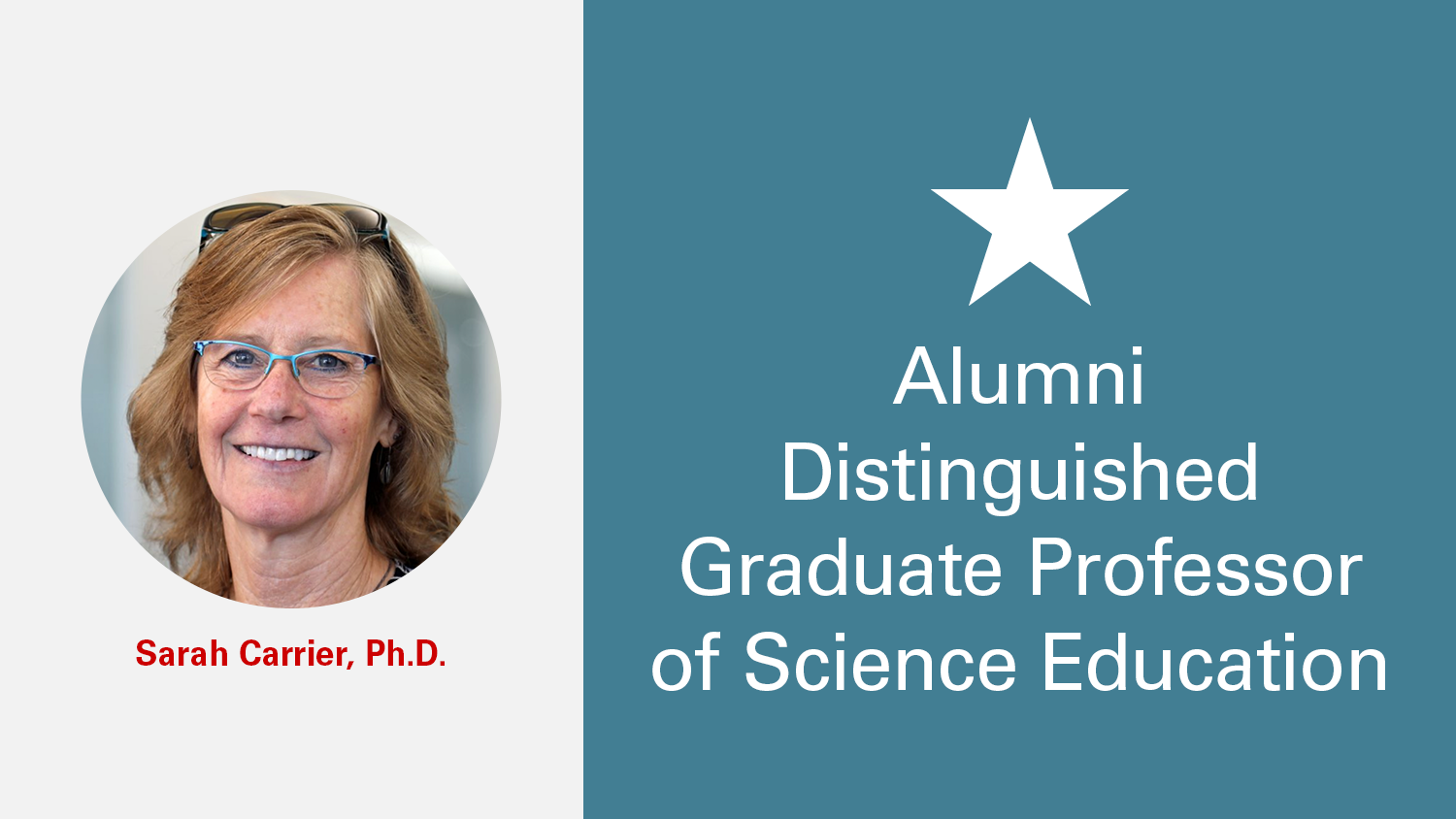Students on Associate Professor Sarah Carrier: ‘She Values Hard Work and Life-long Learning, and Models These Values for Her Students Across All Levels of the Elementary Education Programs’

When Carly Mize ‘21MS took a summer course with NC State College of Education Alumni Distinguished Graduate Professor Sarah Carrier, Ph.D., she received regular reminders of the ways in which science surrounds her every day.
Each lesson in the course would begin with Carrier sharing art, technology or nature photos that captured the “awe in science” and explaining the scientific significance behind the example she chose. It’s a lesson that Mize has incorporated into her fifth grade class at Green Valley Elementary School in Boone, North Carolina, to the delight of her students.
“My students are now coming to class every week with their own ‘awe in science’ pictures and experiences to share with the class,” Mize said. “Dr. Carrier’s ‘awe in science’ lesson experience reminded me that science is beautiful and it highlights the fact that children are natural scientists; they’re always asking questions and wondering why things are the way they are.”
Carrier, an NC State Alumni Association Distinguished Graduate Professor, faculty member in the elementary education program and program coordinator of the elementary education graduate program, said that over the course of her career she has been especially proud of any work she does that expands children’s and teachers’ appreciation for science, specifically in regards to the wonders of nature.
Her research has focused on helping pre-service and practicing teachers expand their visions as science teachers and supporting their communication of science content and practices with children. She places a particular emphasis on environmental education and science instruction using the outdoors as a setting for teaching and learning.
“As someone who spends a lot of time in the outdoors, and who deeply appreciates the beauty of nature, my goals to provide these opportunities for children and thus their teachers was a natural path for my research,” Carrier said.
Carrier’s most recent grant-funded work,“Supporting Elementary Teacher Learning for Effective School-Based Citizen Science (TL4CS),” is providing teachers with professional development and curricular support as they implement citizen science projects that allow students to learn science content while participating in authentic data collection in the outdoors.
She is also the co-principal investigator on the “Bringing a Sense of Awe to Your Science Instruction” project, which explores educators’ experiences to inform the design of future science instruction.
When approaching science instruction, Carrier says she always reminds students that it’s important to view the subject through an interdisciplinary lens. Science is connected to a myriad of other subjects, including mathematics and language arts, and she encourages her students to incorporate science into all areas of their classrooms.
“Sharing the language of science and these connections with children and teachers provides important support for our communication rather than the siloed subject areas that are presented in too many classrooms,” she said. “Workplaces do not separate subject areas, so schools should not either.”
Having spent 17 years as an elementary school teacher herself, Carrier said that experience has offered her examples of the benefits of developing multiple modes of learning for her students who need direct engagement and motivation and designing instruction that builds on their lives outside of the classroom.
Carrier said that one of the most rewarding experiences of her career was helping to launch the College of Education’s STEM-focused undergraduate elementary education program and ultimately building science- and mathematics-focused elementary education graduate programs in the Department of Teacher Education and Learning Sciences.
Doctoral student Danielle Scharen ‘15, ‘19MED, ‘23PHD, credits Carrier’s mentorship and impact throughout all three elementary education programs with helping her continually strive to take the next step in her career and education.
Now an instructor of the Teaching Science in the Primary Grades undergraduate course herself, Scharen also credits Carrier’s support with helping her achieve what she considers to be her greatest academic achievement thus far — receiving the prestigious National Science Foundation Graduate Student Research Fellowship in 2019.
“Because of Dr. Carrier’s constant support and encouragement to exceed my goals, I have no doubt that I will flourish as a doctoral student, researcher and teacher educator. I cannot imagine a better teacher, advisor or personal mentor,” Scharen said. “She sets high standards for her students and advisees and supports them every step of the way. She values hard work and life-long learning, and models these values for her students across all levels of the elementary education programs.”
Even as courses transitioned online during the COVID-19 pandemic, Mize said that Carrier has continued to foster incredible discussions in her courses and has displayed a love and passion for effective science instruction that encourages students to shape their teaching practices to be the best they can be.
Carrier said it’s important to her that students build on their learning experiences, as lectures and memorization alone are not an effective learning method for most people, and hopes that all students leave her courses with an enthusiasm for science.
“My goal is for students to develop a sense of wonder and enthusiasm for science as they learn how to ask questions and base their decisions about their lives and those in their community on strong evidence,” Carrier said.
- Categories:


